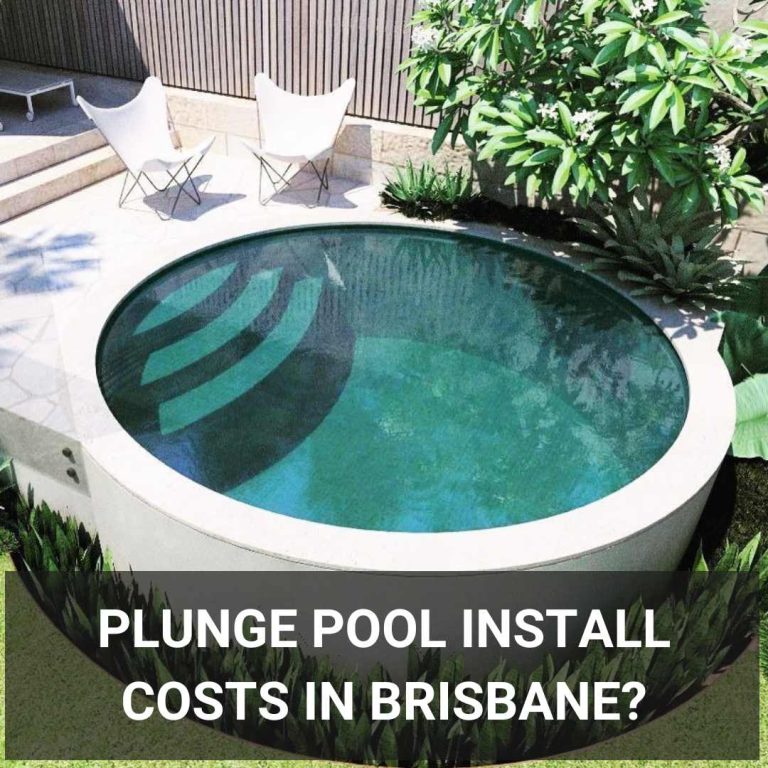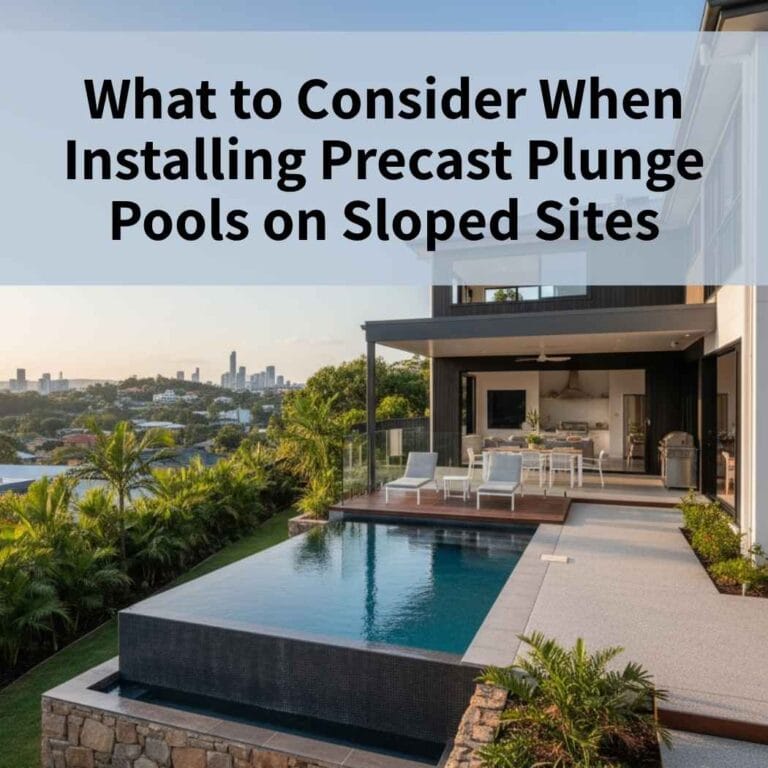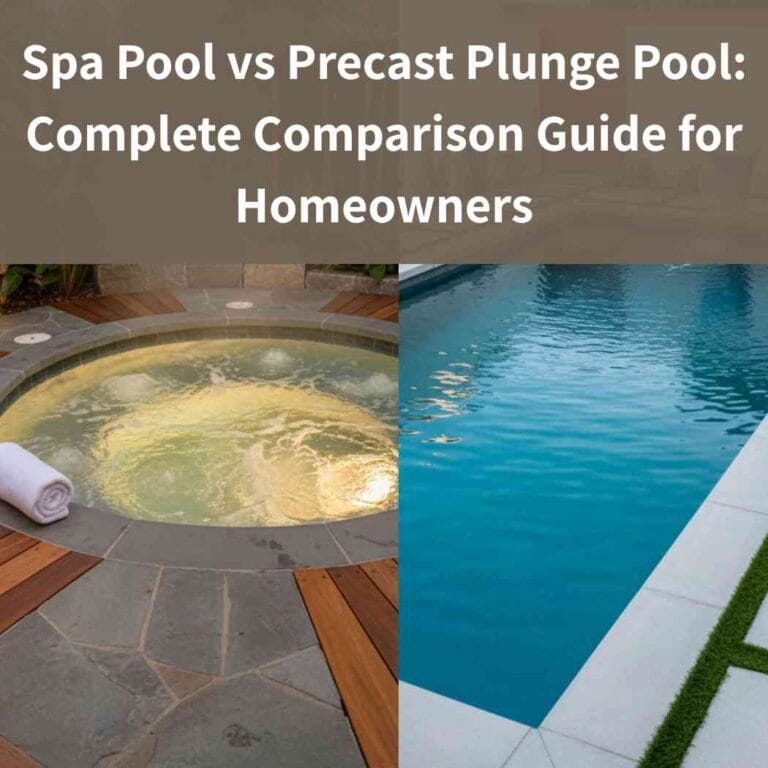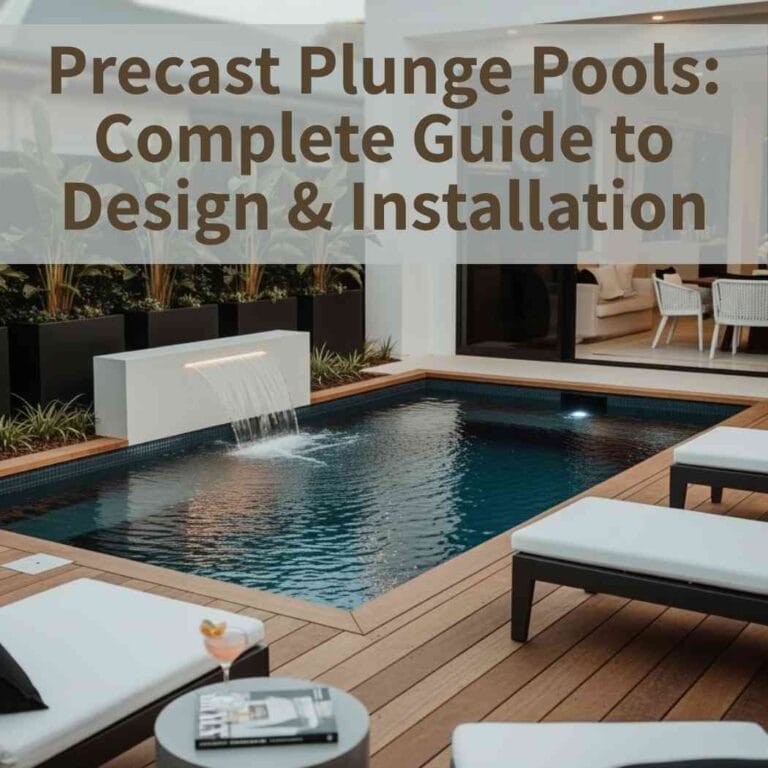If you’re deciding between the two, this guide will make it simple. At Plunge Pools Brisbane, we design and install durable precast plunge pools built for Queensland homes, perfect for hot summers, mild winters, and any backyard layout.
Read on for a side-by-side comparison of spa pools and precast plunge pools, covering design, heating, maintenance, costs, and lifestyle fit, so you know which one works best for your family.
Table of Contents
ToggleWhat is a Spa Pool?
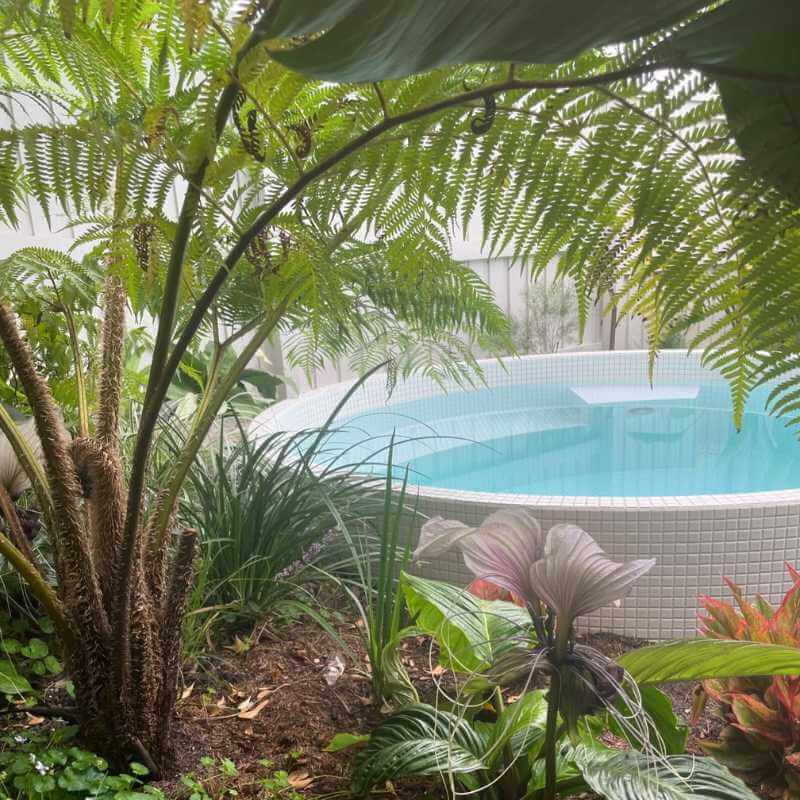
A spa pool is a small heated pool with jets, made for relaxation and hydrotherapy, not for swimming laps.
Most spa pools come with heating systems that keep the water warm, usually between 34°C and 40°C, and built-in seating for comfort. The jets create bubbles and massage effects that make them popular for unwinding after a long day or easing sore muscles.
Common features of spa pools include:
- Compact design that fits on patios, courtyards, or decks
- Hot water system set between 34°C–40°C
- Built-in seating for two or more people
- Massage jets for hydrotherapy and relaxation
Spa pools are a great choice if you want a cosy retreat for health benefits, stress relief, or small social gatherings. They don’t replace a full-sized pool, but they deliver year-round warmth and a private space to relax at home.
What is a Precast Plunge Pool?
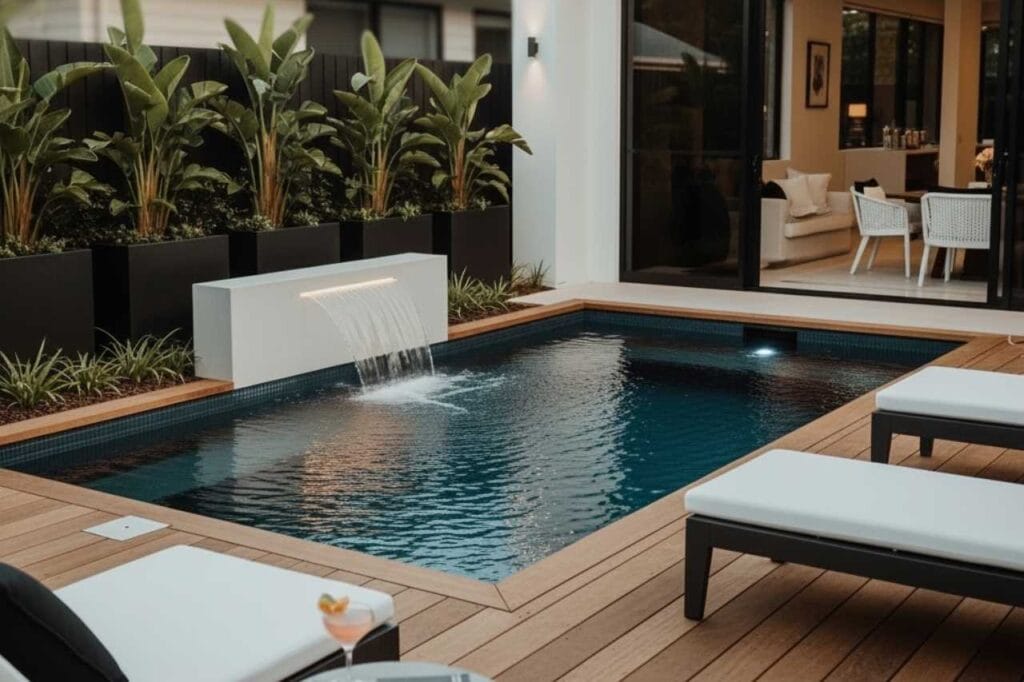
A precast plunge pool is a concrete pool built in a factory and delivered to your home. In Brisbane, they start from around $25,000 and can be installed above ground, semi in-ground, or fully in-ground.
Unlike spa pools, precast plunge pools are designed for swimming, cooling off, and entertaining. They come in different shapes and sizes, making them a flexible choice for small courtyards or larger backyards.
Key features of precast plunge pools:
- Strong precast concrete shell built to last decades
- Flexible installation options (above ground, semi in-ground, or fully in-ground)
- Naturally cooler water, with optional heating for winter use
- Modern designs that suit a variety of backyard layouts
Because they are factory-made, installation is fast and the pool shell is craned into place, then finished with plumbing, decking, and landscaping. For Brisbane homeowners, this means less disruption, lower long-term running costs, and a pool that blends into your outdoor space as a permanent feature.
For Brisbane homeowners wanting a permanent, professionally built solution, our precast plunge pool installation service in Brisbane explains how concrete shells are engineered, delivered, and installed safely on real residential sites.
Spa Pool vs Precast Plunge Pool: Side-by-Side Comparison
Here’s a direct comparison between spa pools and precast plunge pools based on cost, size, durability, and lifestyle fit.
| Feature | Spa Pool | Precast Plunge Pool |
|---|---|---|
| Upfront Cost | $8,000–$15,000 | From $25,000+ |
| Running Costs | Higher (constant heating and pumps) | Lower (heating optional) |
| Durability | Acrylic or fibreglass, shorter lifespan | Precast concrete, long-lasting |
| Footprint & Space | Compact, best for patios and decks | Flexible sizes for small or large backyards |
| Water Volume | Small, usually under 2,000L | Larger, 5,000–20,000L |
| Temperature | Heated, 34°C–40°C | Naturally cool, optional heating |
| Experience | Jets, bubbles, massage therapy | Still water, swimming and relaxing |
| Maintenance | Smaller volume, frequent chemical balance | Larger volume, easier to stabilise |
| Best For | Relaxation, therapy, compact spaces | Cooling off, entertaining, backyard feature |
If cost is your main concern, spa pools are cheaper upfront but more expensive to run long term. Precast plunge pools require more investment at the start but save on electricity and chemicals over time. While spa pools look cheaper upfront, real-world pricing differences are outlined in our guide on the true cost of installing a precast plunge pool in Brisbane.
If durability matters most, concrete plunge pools clearly last longer than fibreglass or acrylic spa shells. And when it comes to lifestyle, the choice depends on whether you want year-round hot therapy (spa pool) or a cool, versatile pool for family and friends (plunge pool).
Key Differences Between Spa Pools and Precast Plunge Pools
Footprint & Space Requirements
A spa pool is compact and best for small patios or decks. A precast plunge pool comes in flexible sizes, from small backyard pools to larger family designs.
If your yard is tight, a spa pool may be the easier fit. But with clever landscaping, even a compact plunge pool can transform a small backyard into a private resort.
For Brisbane properties with uneven ground or hillside blocks, our guide on what to consider when installing precast plunge pools on sloped sites covers excavation, slab design, and retaining solutions that affect cost and safety.
Water Volume & Temperature Range
Spa pools hold less than 2,000L of heated water. Precast plunge pools hold 5,000–20,000L, naturally cooler but with optional heating.
Smaller volume means spas heat up quickly for hydrotherapy. Larger plunge pools stay cooler in summer, but heating gives you year-round use.
Typical Use Cases
- Spa Pool: Warm hydrotherapy, stress relief, and cosy social spots.
- Precast Plunge Pool: Cooling off, swimming, entertaining, and creating a backyard centrepiece.
If you want therapy and relaxation, pick a spa. For versatile family use, a plunge pool works better.
Jets vs Still Water
Spa pools use jets and bubbles for massage therapy. Precast plunge pools use still, clear water, better for swimming and relaxing without moving parts that need constant repairs.
Heating, Energy Use & Running Costs
Spa pools must run heaters and pumps constantly to keep water at 34–40°C, leading to higher energy bills. Precast plunge pools stay naturally cool. Heating is optional and can run on solar or heat pumps, making them more energy-efficient.
If you love year-round hot water, spas deliver comfort but at a cost. If lower running costs matter, plunge pools are the smarter choice.
Maintenance Requirements
Spa pools have a small, hot water volume that changes chemistry quickly. This means more frequent testing and chemical use. Precast plunge pools are easier to stabilise with filters, robotic cleaners, and skimmers, making them lower maintenance long term.
Long-Term Durability & Repairs
Spa pools are usually made from acrylic or fibreglass, which have a shorter lifespan. Pumps and jets wear out over time. Precast plunge pools use solid concrete shells, built to last decades with minimal repairs. This is a key difference in concrete vs fibreglass durability.
Impact on Property Value
Spa pools are often treated as portable backyard accessories. They may improve enjoyment but rarely add resale value. Precast plunge pools are seen as semi-permanent improvements that can boost property appeal and make your home feel more luxurious.
Cost of Ownership
Spa pools are cheaper upfront ($8,000–$15,000) but more expensive to run due to heating and chemicals. Precast plunge pools start from $25,000+ but have lower long-term costs, especially if you avoid constant heating.
When budgeting, think beyond the price tag, consider energy bills and upkeep.
Lifestyle Fit
- Spa pools: best for wellness, relaxation, and hydrotherapy pools.
- Precast plunge pools: best for entertaining, cooling off in summer, and long-term investment in your backyard.
For Brisbane’s hot climate, many families choose plunge pools as the more versatile and future-proof option.
Which Is Right for You?
Choose a spa pool if you want year-round hot water therapy. Choose a precast plunge pool if you want a cooler, low-maintenance pool that suits Brisbane’s hot summers and adds property value.
If your main goal is wellness, relaxation, or easing sore muscles, a spa pool is the right pick. Its hot water and jets create a cosy space for hydrotherapy and stress relief.
But if you’re looking for something that fits the Queensland lifestyle, a precast plunge pool is the smarter choice. Brisbane families love them for cooling off on humid days, hosting friends, and creating a permanent feature that enhances backyard design. Unlike spa pools, plunge pools are seen as long-term assets, which can improve resale appeal in Brisbane’s property market.
In short:
Precast plunge pool = family fun, lower running costs, and long-term value.
Spa pool = personal comfort and therapy.
Ready to Upgrade Your Backyard?
At Plunge Pools Brisbane, we build precast plunge pools that suit Queensland homes designed to handle hot summers, mild winters, and local soil conditions. As a QBCC-licensed pool builder with years of experience, we make the whole process stress-free, from design and council approvals through to installation and finishing touches.
Contact Plunge Pools Brisbane today for your personalised quote and start turning your backyard into a private escape.
FAQs
How much does it cost to install a precast plunge pool in Brisbane compared to a spa pool?
A precast plunge pool in Brisbane generally costs more upfront than a spa pool, starting from around $25,000, depending on size and finishes. Spa pools are cheaper to buy and install, often ranging between $8,000 and $15,000. However, plunge pools usually have lower long-term running costs, especially if you avoid constant heating.
Can a precast plunge pool be installed above ground, or does it need to be in-ground?
A precast plunge pool can be installed above ground, semi in-ground, or fully in-ground. The concrete shell design gives flexibility for sloping sites and smaller backyards. Many Brisbane homeowners choose semi in-ground installations for easier access and modern landscaping options.
Do spa pools or plunge pools require council approval in Brisbane?
Yes, both spa pools and plunge pools in Brisbane usually require council approval and compliance with Queensland pool safety laws. This includes fencing, barriers, and building approvals depending on the pool’s size and placement. Working with a licensed pool builder ensures your project meets all local regulations.
How do precast plunge pools handle Brisbane’s soil and weather conditions?
Precast plunge pools are designed to handle Brisbane’s clay soils and humid climate. The strong concrete shell resists movement and moisture damage better than fibreglass or acrylic alternatives. This makes them a durable, long-term choice for local backyards.
Can you add features like lights, seating, or swim jets to a precast plunge pool?
Yes, precast plunge pools can be customised with lights, benches, water features, or even swim jets. These extras let you create a more personal and functional pool design. Many Brisbane homeowners add LED lighting and built-in seating to boost both style and comfort.
Which option is safer for families with young children — spa pool or plunge pool?
A precast plunge pool is generally safer for families with young children because the water isn’t constantly hot. Spa pools run at high temperatures, which may pose a risk for kids. Both pool types must follow Queensland pool safety laws, including compliant fencing and secure access.

